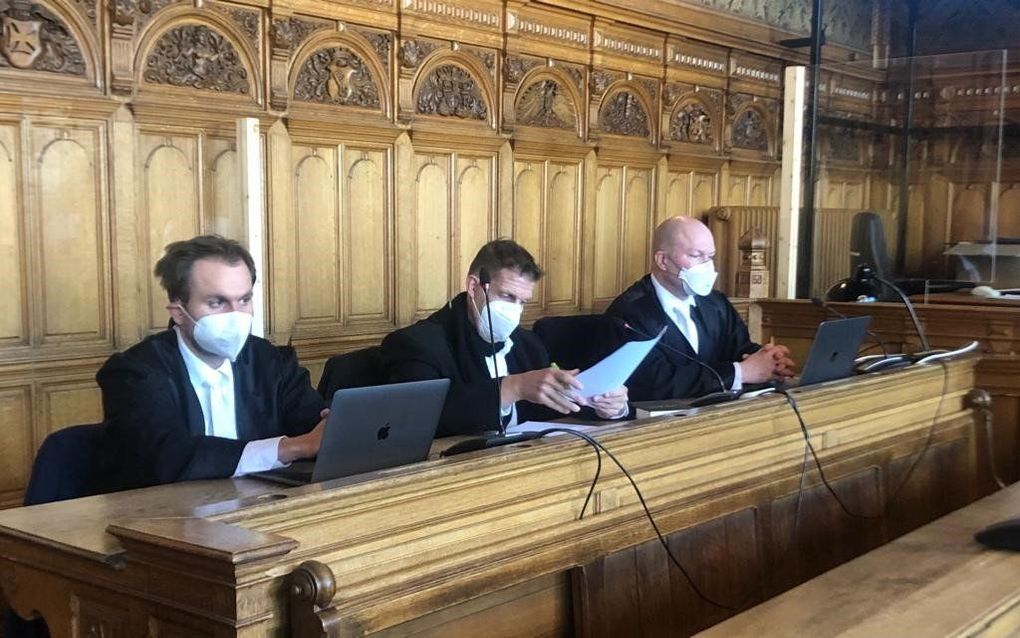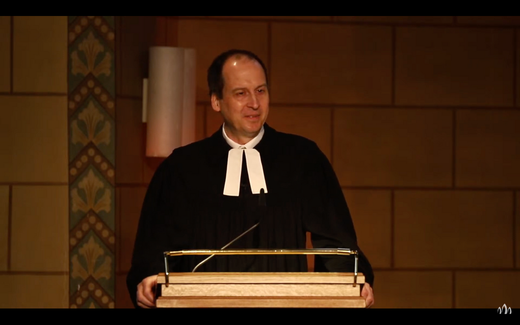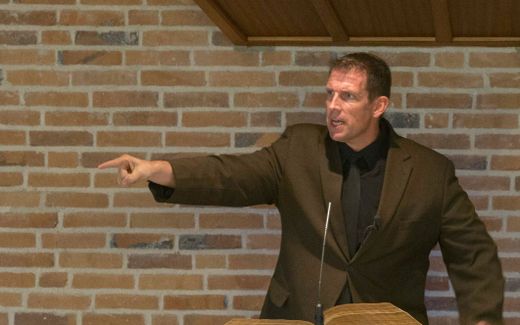Will the judge in Germany say how Mr Latzel should read the Bible?
19-05-2022
Central Europe
Addy de Jong, RD

Olaf Latzel (centre) in court. Photo RD, Addy de Jong
Central Europe
On Friday, the Bremen District Court will give its decision in the case against Rev Olaf Latzel. The Court discusses the way in which Christians interpret the Bible very extensively in the Latzel case. To what extent is it allowed to do so? Six questions and answers.
“Bible study in court”, was the headline of an article in the German newspaper Weser Kurier. The astonishment of the journalists was noticeable in the words.
Understandable. Minutes long Biblical texts resounded in the court room of the District Court of Bremen. They all spoke about sexual morality. “If a man lies with a male as he lies with a woman, both of them have committed an abomination. They shall surely be put to death. Their blood shall be upon them”, the judge cited Leviticus 20:13. Also other verses from this chapter, about incest and bestiality passed in review, in addition to whole passages from Romans 1, 1 Timothy and Revelations.
Last Friday, the Court of Appeal in Bremen went even further during the appeal case of Rev Olaf Latzel. It had asked two experts, namely theologians Isolde Karle and Ludger Schwienhorst-Schönberger to evaluate the Biblical and Christian view on homosexuality.
Whether this intensive Bible study has helped Mr Latzel in his case of appeal, will become clear on Friday morning. Then, the District Court will assess whether the earlier verdict of the Bremer pastor from 2020 remains intact. In 2020, Latzel was fined with 8,100 euros for his statements on homosexuality and the gender ideology.
However, already in advance, the extent to which the court meddles itself in theological issues can be questioned.
Does the German judge overstep his boundaries by interfering in the interpretation of the Bible and Christian faith?
It certainly looks so. A court never can and may determine what is the right interpretation of the Holy Scriptures. That it is moving on thin ice, became apparent, not only last week, but also in 2020 when Mr Latzel was fined for incitement.
The Amtsgericht of Bremen then rejected after much consideration Prof Dr Christoph Raedel as theological expert. Raedel is professor at the Free Theological College (FTH) in Giessen. He was not allowed to testify, because he would have sided too much with Latzel.
Last week, something similar happened. Then the District Court rejected Isolde Karle as expert, also because she was prejudiced. This time, the expert would have shown too much antipathy towards Mr Latzel.
A court that interferes with theological issues will quickly get into trouble. But does it also overstep its boundaries?
That seems to be a hasty conclusion. According to a spokesperson, the court does not aim to establish the right interpretation of the Bible concerning the issue of homosexuality. The court only wants to determine whether the controversial statements of Latzel during a marriage seminar of 2019, still fall within the margins of the Christian view on homosexuality, or whether Latzel follows a completely different course.
According to the court, this has to be clear in order to determine whether Latzel's statements fall under the fundamental right to freedom of religion.
If it comes to this question, what has been the result of the hearings so far?
The least that can be said is that the defence has brought forward many arguments to show that Latzel's views –regardless of his crude wordings– are not as eccentric as some people think. That is made clear, for example by the fact that the Bible condemns homosexual practice in several places, both in the Old and New Testament, but also by the fact that the Christian church has shared this view on relations and sexuality for many ages and the fact that most churches of the world still reject same-sex relationships, even though the Bremer Evangelische Kirche now accepts them.
Which verdicts are possible on Friday?
When the judge, after consultation with the jury, announces the verdict on Friday morning, there are three options. 1. The Court upholds the verdict of the lower court in Bremen: a fine of 8,100 euros for incitement to hatred. 2. The judge rejects the verdict and acquits Mr Latzel. 3. The judge lowers the penalty.
The German Court of Appeal can never penalise a defendant with a higher verdict than the original.
Can the prosecutor go into appeal if the judge decides to acquit Latzel?
Yes, the Prosecutor's Office can go into appeal by the higher Regional Court of Bremen. Latzel can do the same if the judge upholds the original verdict tomorrow. However, when the Regional Court rules, appeal is not possible anymore.
If the judge upholds the earlier verdict tomorrow, what will be the consequences for Latzel?
The consequences are already large for his personal reputation. In the case the verdict remains the same, they will become even bigger. A judicial condemnation will be a national stamp on the demonisation of the pastor, Idea journalist David Wengenroth recently commented. The view that Latzel is a hate preacher will then be officially confirmed.
It will then become even more tensive to see what the Bremer Evangelische Kirche (BEK) will do. Will she ban the pastor of the Martini Church again? And if it does, will the Martini congregation accept that decision?
Related Articles





